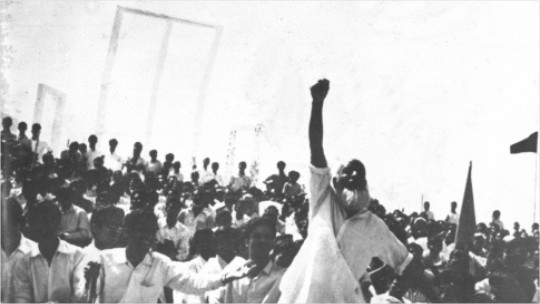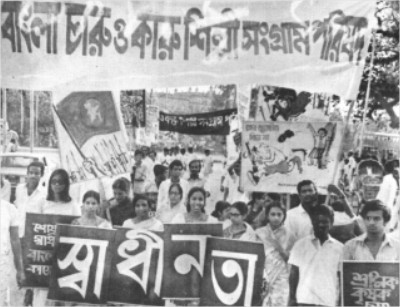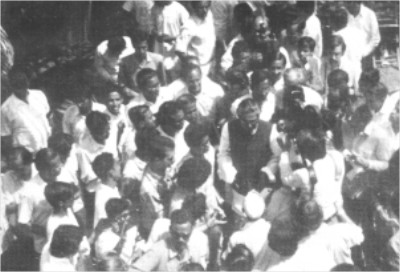
Inside
|
From the Archives From non-cooperation to People's Raj To commemorate the historic month of March, we here reprint from our archives Rehman Sobhan's fascinating look at history unfolding from the March 13, 1971 issue
There are few precedents for what is going on in Bangla Desh today. In a matter of one week a de facto transfer of power from the Islamabad government to the people's representatives has been effected. This has not been achieved by any spectacular victory on the battle front or by foreign intervention, or a formal surrender of power by the rulers, but largely by peaceful means. One says this in spite of the massive death toll in the last week because these deaths were at the cost of the people of Bangla Desh and the forces of oppression. The unique feature of this condition springs from the fact that peaceful non-cooperation has been taken a stage beyond to active cooperation with the people's representatives. In most freedom struggles non-cooperation was a vital element in the struggle. This was designed to paralyze the economy and administration and make life for the rulers untenable. Such a move could not be sustained indefinitely because the ruling power could always depend on a class of collaborators from the ranks of the administration, business and property owning classes. These elements have made it possible for even the French to enforce their writ in Indo-China at the height of the resistance and even the Germans and Japanese to keep the society functioning during the period of occupation in Europe and South East Asia. In the freedom struggle in India, the civil service, judges and other elements, were always available to keep the show on the road and the police force was there to enforce law and order at all times. Only very rarely were troops required and this too in support, rather than in substitution, of the local administration. What is therefore unprecedented for Bangla Desh is the fact that non-cooperation with the rulers in Islamabad is total. For the last week, not a single element in the administration has been available to collaborate, from the chief justice of East Pakistan, to the chief secretary. This has never happened to my knowledge in any other country, in contemporary history. In the extraordinary case of Radio Pakistan, when the military arbitrarily suspended the broadcast of Sheikh Mujib's speech at the Race Course, after having given prior permission, the staff simply closed shop and went home. This created a major crisis in the districts where the abrupt cancellation of an announced broadcast threatened to create a law and order situation as people suspected that Mujib had been arrested. When this prospect was intimated to the military authorities, along with the fact that no news at all would henceforth be broadcast from any radio station in Bangladesh, they agreed to let the news be broadcast on the 8th morning. On such terms did the Radio network here resume operations and continue to operate their own news bulletin from Dacca Betar Kendra, leaving Radio Laos from Karachi to tell us all about news in Laos and the Middle East -- anywhere but about Bangla Desh. Non-cooperation was however only a first step. Even more remarkable has been the evolution from non-cooperation with Islamabad to cooperation with Sheikh Mujibur Rahman. Whilst the Eden Building remains a mausoleum for lost hopes, administration has come to life on Road 32, Dhanmondi, the residence of Sheikh Mujibur Rahman. From March 4, policy statements designed to restore normalcy in the province began to emanate from Road 32. The first decrees permitted banks to re-open from March 5, between the hours of 2.30 and 4.30, where they were permitted to encash cheques to a limit of Rs. 1500. The next day this was elaborated to permit encashment of cheques for payment of wages and salaries, but these required authentication by the trade union leader of the establishment. These steps were dictated by the fact that the common man was beginning to feel the pinch. The breaking of the crisis coincided with pay day in many factories and establishments and workers were faced with starvation unless they had some cash in hand. The revival of banking has not been without problems. To begin with, there was a run on the banks for fear that banks may close again, rather than any threat of their imminent bankruptcy. In outlying districts, branches could not open because they had exhausted their cash reserves and could not replenish this from their head office in Dacca due to the breakdown of communications. This has been partially normalized with improvements in the communications network. It is expected that very soon people's preference for cash will decline and the run on the banks will be reversed. The operation of the banks for only two hours however restricted the activities of the banks and a further decree on March 8 enabled them to operate longer. The decree permitted banks to also make disbursements for raw materials for the operation of factories, since the factories had been permitted to operate from March 5 but were put into difficulties because of banking restrictions. All these measures were dictated by the need to revive the economy and mitigate any hardship for the workers. The main problem was however to restrict a run on the banks and a flight of capital from Bangladesh. In the same way, the decree of March 9 permitted a selective revival of governmental activities. Parts of the State Bank needed to serve the banks, were opened up. Farmers were feeling the pinch so the Agricultural Development Corporation was opened to resume supply of fertilizer to farmers and operate power pumps to water the winter crop. Jute and rice seed distribution was permitted. Movement of food-grains and operation of food godowns was also permitted as were operation of utilities and arterial transport. For the rest, the Eden Building, courts, and kutcheries remained closed. Another and more elaborate decree of March 12 carried the principle of selective non-cooperation a stage further. This, however, did not mean that all civil servants were sitting idle. They were carrying the struggle from its phase of non-cooperation to active cooperation with the Awami League. Groups of officials accepted the task of identifying problems and presenting them to Sheikh Mujib for decision. A sort of improvised secretariat was in operation, where streams of businessmen and civil servants were visiting in search of solutions to problems, consultation and reassurance. The conditions of work were difficult, but decisions were being made and in many cases more rapidly than within the Eden Buildings. This left much to be desired in the organizational apparatus, conditions of work and modus operandi. The lack of experience of the decision makers itself is a constraint. But work went on. Today, as a result, writ of the people's representatives covers the four corners of Bangladesh. Secretaries, deputy commissioners, circle officers, policemen, are all taking orders from them. Police operate in conjunction with the AL volunteers to enforce a degree of law and order which is unusual, considering the troubled times. Local authorities in the mofussil have begun to collaborate with the Sangram Parishad (Resistance Committees) and take directives from them. Today, in fact, effective power and decision making within the administration emanates from one source -- the Awami League. Whilst the collaboration of the administration provides a unique dimension to the present situation it is, in terms off effectiveness, far less significant than the response of the people. The sanctions on the senior administrators for instance are, in practice, being exercised by their own subordinates, the Class III and IV employees. Their overzealousness in safeguarding any attempt to sabotage party decisions has occasionally paralyzed those areas where administration has revived and sent officials weeping to Dhanmondi for assistance in imposing their own authority. Effective power has now moved from the Secretary to his subordinate and, even when normal lines of authority are restored, the relationship between the boss and his subordinate can never be the same again. In private banks and offices again, as in factories, it is the workers who are safeguarding the interests of Bangladesh from evasion and possible sabotage by the top executives. Whilst many of these have collaborated, either out of a genuine sense of commitment or simple fear of their subordinates, some have attempted to use the relaxations permitted by the decree to secrete money out of the system. That it is not much worse must owe to the patriotism and vigilance of their own employees.
The movement has in effect released untold resources from within the people. Today, in law, there is no government in Bangladesh nor the sanctions which go with it. The limited decisions and authority exercised by the Awami League are not enforceable in any court of law nor is there any effective machinery to put their decisions into effect. If they pass a decree prohibiting private banks from remitting money out of Bangladesh or withdrawals for unauthorized purposes there is none to enforce it for them. This extraordinary set up is thus predicated on the unstinted loyalty and co-operation of the common man with the people's representatives. We have seen how in offices it is the clerks and lower division worker who act as custodians of the public interest. Outside, in spite of some initial anarchy which found expression in looting and communal vandalism, normalcy has returned. Even the escaped convicts seem to be acting with patriotism and restraint. Police report an actual decline in the crime rate from normal times. Today they collaborate with the green-capped Awami League volunteers to police the towns not just against a recrudence of violence but generally to ensure law and order. In Gulshan and Dhanmondi, where middle class nerves are particularly on edge, volunteers have been visiting houses and making their presence felt. This is not to say that some peaceful nirvana has descended upon Bangla Desh either. It is reported that chemicals for explosives have been taken away from the Dacca University Laboratories and the PCSIR laboratories by armed bands. Sentries of VIP's have been overpowered and their weapons seized. The other face of the struggle is going on and one can be sure that in any future upsurge violence will not be one sided.
In this context, all attention is directed to Yahya who is expected any day. Lt. General Yakub left Dacca on the 9th and was replaced by the governor designate Lt. General Tikka Khan. It is reported that Yakub had no stomach for killing people whose language he learnt and culture he admired, in support of a lost cause. The security forces were apparently staying within barracks avoiding confrontation. Indications are that they are marking time for Yahya's arrival. And what does this promise? Yahya's strategy over the last week indicates the use of the carrot and the stick. Whilst the tone of his broadcast on the 6th was designed to give maximum offence to Bangla Desh, in substance, the declaration of a date for the assembly, without preconditions, was a climb down. But then his reference to LFO and his despatch of a reputed hawk to replace Yakub indicated the brandishing of a big stick. But again Tikka Khan has shown relative restraint since his arrival. Now we find the great Chairman Bhutto shedding a few crocodile tears for his dead victims and talking the language of conciliation in his cable to the Sheikh. The wellsprings of bitterness and frustration generated by recent events invoke only suspicion within the people. Many see this as a gesture to buy time before the final showdown. This is envisaged as taking place when Yahya vetoes a Six Points based constitution. By this time sufficient reinforcements will be at hand to cope with all eventualities.
Mujib would then have to decide whether demand for de jure rather them de facto power was sufficient to precipitate confrontation or whether he should go ahead and join the constitutional debate whilst consolidating his hold on Bangla Desh. He must have realized by now that in any system controlled from Islamabad provincial power has limited attractions. He has no control of domestic revenues, foreign exchange, or aid. He will also face the risk of veto once he passes his draft unless Yahya has realized that Six Points is the best of all evils he faces in his confrontation with Bangla Desh. If Mujib can get Six Points carried he may possibly be able to contain his own hawks and keep the polity together. If, however, Yahya vetoes or Bhutto again sabotages the Assembly then Mujib will have no option but to seek a showdown on the streets. With his middle class base becoming progressively more irrelevant, he is becoming more dependent on the people to sustain his present confrontation and to lead any future movement. Here he will have to decide between leading their struggle in a full fledged people's war or making himself redundant in their next and final upsurge. Photo Courtesy: Muntassir Mamoon & Rashid Talukdar Rehman Sobhan is Chairman, Editorial Board, Forum. |


 Militancy is reflected in the spontaneous acts of resistance against the security forces. Their own press note reported that supplies to their base areas in Sylhet and Jessore were interrupted. It took eighteen hours for a supply convoy to get from Khulna to Jessore because of cuts in the road by peasants. In Chittagong, M. V. Swat carrying the first reinforcements from West Pakistan, had been partially unloaded into wagons. But workers, taking their own initiative, suspended unloading and removed the becalmed wagons. All this reflects the spontaneous response of workers, peasants and the common man to what they feel is astruggle for survival.
Militancy is reflected in the spontaneous acts of resistance against the security forces. Their own press note reported that supplies to their base areas in Sylhet and Jessore were interrupted. It took eighteen hours for a supply convoy to get from Khulna to Jessore because of cuts in the road by peasants. In Chittagong, M. V. Swat carrying the first reinforcements from West Pakistan, had been partially unloaded into wagons. But workers, taking their own initiative, suspended unloading and removed the becalmed wagons. All this reflects the spontaneous response of workers, peasants and the common man to what they feel is astruggle for survival.  But another school sees Yahya coming to terms with reality in Bangla Desh. For effective power is now irrevocably out of the hands of Islamabad and any attempt to re-establish it will require the reconquest of the whole province piece by piece. Nor can they expect people to merely play the role of live targets for the movement has advanced, light years between March 1 and 10. In this situation Yahya may well cede Mujib's demands de facto. He will let him continue to exercise power in Bangla Desh, he will keep his troops in the barracks, he will, in effect, end martial law by the simple expedient of not enforcing it. This will then be presented as an exercise in restraint and good faith which should be sufficient to let Mujib come to the National Assembly.
But another school sees Yahya coming to terms with reality in Bangla Desh. For effective power is now irrevocably out of the hands of Islamabad and any attempt to re-establish it will require the reconquest of the whole province piece by piece. Nor can they expect people to merely play the role of live targets for the movement has advanced, light years between March 1 and 10. In this situation Yahya may well cede Mujib's demands de facto. He will let him continue to exercise power in Bangla Desh, he will keep his troops in the barracks, he will, in effect, end martial law by the simple expedient of not enforcing it. This will then be presented as an exercise in restraint and good faith which should be sufficient to let Mujib come to the National Assembly.